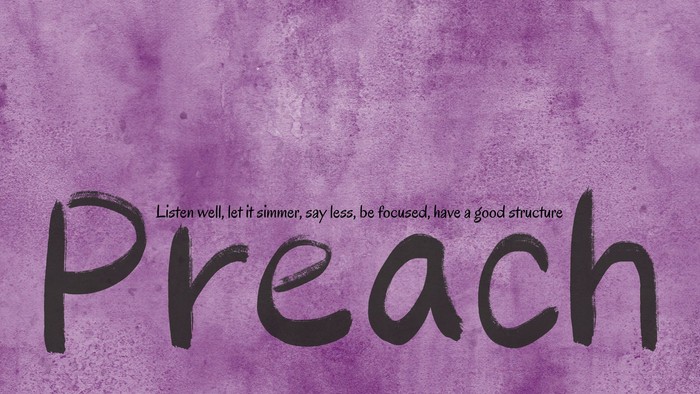25/05/2025 0 Comments
Five Tips for Crafting a Sermon that Connects...
Five Tips for Crafting a Sermon that Connects...
# Foundations Feeding

Five Tips for Crafting a Sermon that Connects...
I love preaching and have been doing it for over twenty years. And I love listening to other preachers who take me on journey that connects the Bible with the activity of God and the lives that people are living.
I also know that preaching is NOT easy: that sermon preparation can feel like doing battle or wading through treacle or getting lost in a jungle; that some sermons start brilliantly but lose momentum (and listenability) and therefore lose their listeners. And I am convinced that neither good intentions, nor passion for God, nor even immense depth of knowledge automatically result into a decent sermon.
There are many different styles and ways of preaching, but I have learnt that there are a few tips that can be applied in most situations and that help a Bible passage connect with people lives and the activity of God.
My Five Tips
#1 Listen well. I am utterly convinced that good listening is the secret of a great sermon. Listen to the Bible passage and its surrounding context (read two or three different translations). Notice what is going on in people's daily lives and in the wider world in the days before you preach. Tune in to the whispers and stirrings in your soul and discern if these are the nudgings of God (and be aware of your own bias, agenda and blindspots). And read scholars who have different backgrounds and experiences from each other (when I realised I was only reading scholars who were white, male leaders of western theological institutions or large churches, I began ensuring that for every sermon I read at least one or two scholars who did not fit this description).Smme Listening well helps you connect and leads to a much richer sermon.
#2 Let it simmer. Make time near the start of the week to spend half an hour reading the passage and getting familiar with it. And then let it keep you company as you get on with your week. Let the words simmer and pop up in your mind, reflect on phrases, images and themes and see what settles and connects. Later in the week you can make time to shape and write the sermon (it's up to you if you write word for word or not), but if you've done the midweek listening & simmering, you'll probably find things take shape more easily.
#3 Say less. You cannot include into your sermon all the reading and all the ideas that you've got. I remember my dad saying when I started out 'the secret of a good sermon is what you don't say.' A few years later, at a memorable Greenbelt session, Nadia Boltz-Weber advised that 'Exegesis is like underwear. You need it. But no one needs to see it.' Be willing to capture a whole wealth of discovery and insight into two sentences. Be wise enough to discern what the pertinent things are that need saying in your context at that time. And don't say the other stuff. Trust that it will remain as the hidden foundations that will give you the authority to speak without needing to be explicity shown (like underwear!)
#4 Be focused: By the time you're ready to preach your sermon, it's great if you can summarise your main message into a single sentence. I like the analogy of viewing the main focus of your sermon as being the washing line that ties everything together, and on to this you might peg three or four items, which are the main points you are making. The caveat to this, is that the takeaway people get from your sermon might be something quite different from your main focus! And that's okay. But by having a focus, you'll have a shape and direction to your sermon from which each listener can take God-inspired diversions.
#5 Have a clear structure (and a good pace): Start by showing people how the thing you're focusing on links with their lives. You could ask a question, use an analogy, reflect on a shared experience (you don't need to tell jokes or a story). Have two, three or four sections in the middle, and try to give each section a one line subheading that summarises the message of the section (If you can't do that then you've not got enough focus). Finish with something inspiring (you don't need actually tell them what to do about the sermon)
A final word: Preaching is a craft and a joy that gives glory to God. Do it humbly. recognising your limits and your unique character. And go for it.

Comments